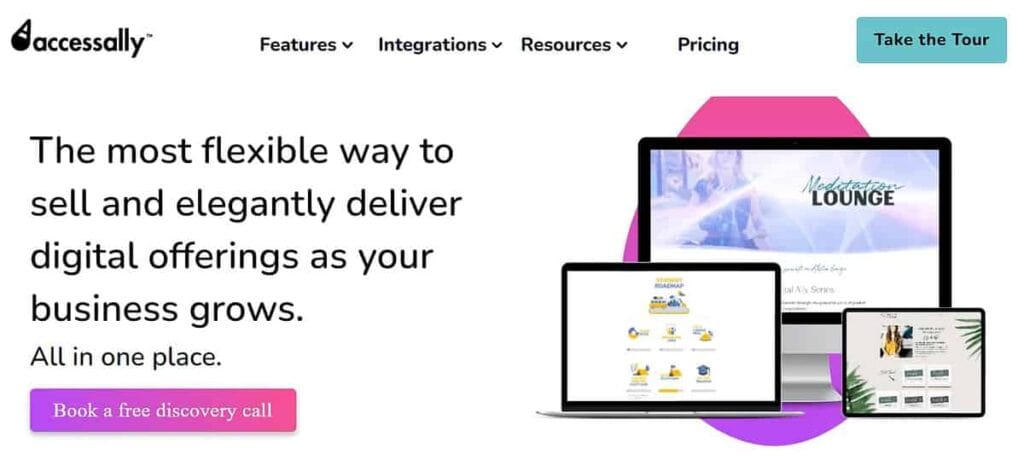In today’s fast-paced world, where stress levels are high, and people are looking for ways to improve their well-being, the demand for meditation is on the rise.
Meditation businesses can take many forms, from one-on-one coaching sessions to group classes, online courses, and even meditation retreats.
The possibilities are endless, and with the right tools and strategies, starting a successful meditation business is within reach.
As we delve deeper into this topic, we’ll explore the benefits of starting a meditation business, the potential challenges you may face, and, most importantly, how AccessAlly can help you streamline your business operations and grow your brand.
But first, let’s journey inward and discover your why for starting a meditation business.
Why start a mediation business?
Meditation, yoga, mindfulness training, and other forms of wellness practices are more than just a passing trend. They have become an integral part of people’s daily lives.
Meditation is mainstream, so much so that according to a report by Research & Markets, 36 million Americans practice meditation, powering a $1.86 billion industry in the USA as of October 2022.
In another report, according to Data Bridge Market Research, the global meditation market size was valued at $5,295.07 million in 2022, and it’s projected to grow at an impressive rate of 18.5% year-on-year till 2029.
The reason is simple enough – not only has meditation been around for thousands of years, but it has also been proven to help reduce stress, improve focus and productivity, and lead to better health outcomes.
In a world where stress and burnout are all too common, more and more people are seeking ways to take care of their mental and emotional health, and meditation is a perfect solution.
If you’re passionate about meditation and helping others achieve greater health and well-being, starting a meditation business is a no-brainer.
With the meditation industry growing at an unprecedented rate, there’s never been a better time to become a meditation teacher and launch your own meditation startup.
Whether you’re looking to offer one-on-one coaching sessions, group classes, or online courses, there’s a wealth of opportunities to explore and expand your business.
If you’re ready to embark on a fulfilling and rewarding journey where you get to help others improve their lives and well-being, a mindfulness business may be just what you need.
Let’s dive deeper into how you can make it happen!
How to start your meditation business
Starting a new business can be an exciting and rewarding endeavor, but it also requires intricate planning and attention to detail.
If you’re looking to start a meditation business, there are several key factors that you need to consider and incorporate into your business plan.
Based on our experience working with meditation teachers, we’ve outlined a comprehensive step-by-step plan to help you set up an online meditation studio with AccessAlly.
From identifying your target audience and niche to developing your business name and branding strategy, each step is crucial to building a strong foundation for your business.
Here goes!
1. Get certified
Becoming a certified meditation instructor isn’t a requirement, but it can give you the edge you need to stand out in a crowded market.
Trust is everything today, and clients are looking for instructors who have the credibility and confidence to guide them on their meditation journey.
There are many training providers out there, but not all have proper meditation teacher training.
If you are serious about your mindfulness meditation venture, it’s essential to research the certification you want to obtain and choose a provider that covers the areas you’re interested in.
Once you’ve obtained your certification, it’s important to invest in professional development to build your credentials and skills throughout your career.
As the industry evolves and new research emerges, staying up-to-date with the latest developments can help you stay ahead of the curve and provide your clients with the best possible experience.
2. Register your business and understand the legal requirements
Starting a meditation business requires more than just passion and expertise.
You also need to ensure that your business is set up correctly and that you have met all the legal requirements in your country.
Failure to do so can result in fines, legal issues, and even the closure of your business.
Here are some things you need to do to ensure that your business is legit.
Register your business as an LLC or Corporation
This not only protects your personal assets but also gives business owners a more professional and legitimate image.
You will also need to register for taxes, learn about pass-through taxation, and open a business account to keep your finances separate from your personal ones.
Set up your business accounting
This is essential to ensure you stay on top of your finances.
If accounting is not your strong suit, consider outsourcing to an accountant who can not only manage your finances but also advise on financial matters like tax exemptions and deductions.
Obtain the required permits and licenses
To operate legally, you need to obtain all relevant permits and licenses. If you’re unsure what these are, you can check with your nearest local clerk’s office.
If you’re setting up a yoga studio space, you’ll also need to get a certificate of occupancy to ensure the space is safe and meets all the necessary regulations.
Get your business insured
Getting insured is crucial to protect your business and its finances.
Business insurance, such as general liability insurance, can protect your business from things like property damage, accidents, and other unexpected events.
3. Choose a niche
Choosing a niche for your meditation business is an essential step in setting yourself apart from your competition.
However, it’s not just about picking a niche; it’s about choosing the right one that appeals to a large enough audience and is aligned with your passion and expertise.
Here are some tips to choose a niche:
- Identify your passion: Consider the types of meditation practices that you have the most experience with and enjoy the most, such as spiritual meditation, focused meditation, movement meditation, or any other practice that resonates with you.
- Research your target audience: Identify the needs and interests of your potential customers, and determine what meditation practices are most popular in your area or target market. Tailor your services to meet the specific needs of your audience so you can stand out from the competition.
- Analyze the competition: See what other meditation businesses in your area or niche are offering. Identify any gaps in the market that you can fill to differentiate your business from others.
- Consider your Unique Selling Proposition (USP): Identify what benefits you offer that are different from other meditation businesses, such as teaching style, approach to meditation, or experience.
- Evaluate your expertise: Determine if you have the necessary skills and qualifications to provide high-quality services to customers in your chosen niche. Consider your own experience and expertise to ensure you can deliver value to your clients and build a solid reputation in your niche.
- Test your idea before committing to a specific niche: Conduct surveys or focus groups to see if there is demand for your services and if your target audience is willing to pay for them. This will help you validate your business idea and make any necessary adjustments before launching your business.
4. Define your services
When designing your services, keep in mind the needs and interests of your target audience, as well as your expertise and unique selling proposition.
Let’s discuss this with two cases.
Case A
Target audience: Corporate beginners in meditation.
Solution: Offer a 6-week course on LinkedIn that focuses on foundational skill building.
This approach will allow you to:
- Introduce participants to meditation in a structured and supportive environment.
- Offer one-off sessions to give additional guidance.
- Help participants overcome any obstacles they may encounter.
Case B
Target audience: Experienced corporate meditators.
Solution: Design an advanced 6-week course that explores more complex meditation techniques and practices.
This approach will help you:
- Attract a more specialized and dedicated audience who are seeking to deepen their practice and take it to the next level.
- Offer additional, relevant services like private coaching sessions, group meditation classes, online courses, and workshops.
- Conduct specialized activities like guided meditations, mindfulness coaching, or corporate programs for businesses looking to improve their employees’ well-being and productivity.
When defining your services, it’s important to keep in mind your target audience’s preferences and interests.
Conduct market research to determine what types of services are in high demand and tailor your offerings to meet those needs.
5. Set your pricing
Setting your pricing for your meditation business is a critical step in ensuring your business’s success.
Look at businesses in your area and in your niche to find a baseline for your pricing.
This will give you an idea of what other businesses are charging and help you determine a fair and competitive price.
Here are some steps you can follow to help set your pricing:
Determine your costs
Determine the costs associated with running your business, including rent, utilities, supplies, insurance, and other expenses.
This will help you determine the minimum price you need to charge to cover your costs and make a profit.
Evaluate your pricing strategy
Determine your pricing strategy, such as charging per session, offering packages or memberships, or offering discounts or promotions.
Evaluate this regularly and make necessary adjustments.
Test your pricing
Test your pricing with your target audience and gather feedback.
Make adjustments as necessary to ensure that your pricing is competitive, fair, and sustainable.
Set your online course pricing in a way that is fair and competitive, while also ensuring that your business is profitable and sustainable in the long run.
6. Decide how to deliver your meditation sessions
Deciding how to deliver your meditation sessions is an important consideration when starting your meditation business.
Here are some different approaches you can take:
1-to-1 coaching sessions
Personalized coaching sessions can be delivered in person or online with video software like Zoom.
This approach is suitable for people who have specific meditation goals or challenges that require individualized attention.
With 1-to-1 coaching sessions, you can provide tailored guidance and support to help your clients achieve their meditation goals.
Group coaching sessions
Group meditation classes provide a supportive environment and a sense of community for participants to practice meditation together.
Group coaching sessions are also a great way to create a shared experience for your clients and help them build connections with others who are interested in meditation.
This format also allows you to reach a larger audience and can be a cost-effective way to deliver your services.
Online courses
Online courses allow participants to learn and practice meditation from the comfort of their own homes.
This format is suitable for people who prefer the flexibility and accessibility of online learning.
Online courses can be pre-recorded or delivered live, and can include video and audio content, written materials, and interactive exercises.
By delivering your coaching and courses online, you may not need to pay for a studio space, which can save you money on rent and other expenses.
A variety of delivery options can help you cater to a wider range of clients and build a strong and sustainable business.
7. Outline your marketing strategy
Having a solid marketing strategy is crucial for the success of your meditation business.
With so many different tools and tactics available, it can be difficult to know how to market your course.
Here are some marketing tools you can use to promote your business:
Social media
Social media is a great way to connect with potential clients and showcase your services.
You can post testimonials and video content, live stream your sessions, and share helpful resources and tips.
Social media platforms like Instagram and Facebook also offer targeted advertising options, which can be an effective way to reach a larger audience.
Email marketing
Email marketing is a powerful tool for keeping your customers up to date with your latest services, resources, and business updates.
You can use email marketing to nurture your existing clients and build relationships with potential customers.
Consider offering exclusive discounts or free resources to subscribers to incentivize them to sign up.
Affiliate marketing
Affiliate marketing is a way to reward happy customers for referring others to your business.
By offering a commission or other incentives, you can encourage your existing clients to promote your services to their friends and family.
This can be a cost-effective way to reach a larger audience and build your brand reputation.
Lead magnets
A lead magnet is a free resource or service that you offer in exchange for potential customers’ email addresses or contact information.
For example, you could offer a free beginner’s course to encourage people to sign up for your email list.
This approach can help you build your email list and nurture potential customers over time.
A great website
A good website is essential for making a good first impression and driving visitors to convert into paying customers.
Your website should be easy to navigate, visually appealing, and showcase your services and expertise.
It should also be optimized for search engines to ensure that potential customers can find you online.
Having said that, keep in mind that marketing is an ongoing process, so it’s important to regularly evaluate and adjust your strategy based on your results and feedback from your customers.
8. Set up your website
Having a professional website is essential for any meditation business. It’s often the first point of contact potential clients will have with your brand, so it’s important to make a great impression.
Here are some essential elements your website should include:
Homepage
Your homepage should be engaging and informative. It should have:
- A clear and concise description of your meditation business.
- Your mission statement.
- Your unique selling proposition (USP).
You want to communicate what sets your business apart and why potential clients should choose you.
Services
Your website should include a dedicated services section or page that lists your meditation services.
This can include detailed descriptions of each service, including the benefits, pricing, and availability.
All of this information is essential to help potential clients decide which service is right for them.
About Us
Your “About Us” page is where you can tell your story.
Include information about your meditation training, certification, experience, and personal philosophy and values to help potential clients get to know you and your approach to meditation.
You can also include testimonials from satisfied clients here to increase credibility and authenticity.
Free resources
Offering free resources on your website is a great way to help visitors learn more about meditation and mindfulness.
This could include guided meditations, articles, blogs, and videos. Offering free resources is a great way to build trust and establish yourself as an expert in your field.
Contact information
Your website should include a clear and visible contact form or email address where potential clients can reach out to you for more information or to book a session.
Make it easy for potential clients to get in touch with you.
Online booking and payment system
If you offer services that require booking and payment, include a user-friendly online booking and payment system on your website to streamline the sales process and increase conversions.
This can help potential clients book and pay for your services quickly and easily.
Privacy policy and terms and conditions
Include a clear and detailed privacy policy and terms and conditions that comply with data protection regulations and outline your business policies and practices.
This is essential to protect your business and establishes trust with potential clients.
Plus, if you want to deliver online meditation courses and coaching, you’ll need a plugin like AccessAlly to help you create, market, and sell courses and manage online coaching sessions.
What tools do you need to support an online meditation business?
Running an online meditation business requires the right set of tools, and there’s no better way to manage everything in one place than using AccessAlly.
This powerful WordPress plugin packs a punch, combining LMS, membership, community, and CRM functionality into one seamless package.
Here are some of the features that make AccessAlly the perfect choice for managing your meditation business online:
Learning Management System (LMS)
With AccessAlly, you can create, market, and sell online courses with ease on WordPress.
Whether you’re offering a beginner’s course or an advanced program, the LMS makes it easy to create and organize your content, set up drip-release schedules, and keep track of your students’ progress.
Ongoing monthly memberships
Membership sites provide a steady stream of recurring revenue and help with client retention.
With AccessAlly, you can easily create a membership site and drip-release pre-prepared content, like courses, modules, and resources, keeping your members engaged and motivated.
Fully customizable coaching portal
AccessAlly’s coaching portal makes it easy to provide individualized support to your 1:1 clients. Create individual coaching dashboards, online courses, and digital coaching materials within your coaching membership site.
Community management
Building a sense of community is crucial for a successful meditation business. AccessAlly provides community management tools to help you nurture engagement and motivate your clients.
Affiliate marketing tools
Word-of-mouth marketing from existing customers can be one of the most effective ways to promote your business.
AccessAlly’s affiliate marketing tools help you harness this power, allowing you to track referrals and reward affiliates for their efforts.
Member directory
AccessAlly’s member directory feature allows you to collect key data, display course progress, create private or public member directories, and have members manage their own listings.
You can also provide individual feedback to clients through the LMS private note feature.
eCommerce and marketing features
AccessAlly’s eCommerce and marketing features help you promote your courses and coaching services, including:
- Conversion-focused order forms.
- Recurring payments with Stripe & PayPal.
- Trial offers.
- 1-click upsells and order bumps.
- Coupons.
- Bulk course enrollment.
- Affiliate tracking.
- Abandoned cart follow-up.
Gamification features
Gamification features like quiz creation, leadership boards, and points systems help clients learn and stay motivated, and nurture healthy competition.
Integrates with your current systems
AccessAlly integrates with your current systems, whether it’s your CRM or email marketing platform.
AccessAlly also has built-in email capabilitites and other key features, making it the only tool you need to run your online meditation business.
From course creation to community management, marketing, and eCommerce, AccessAlly is an all-in-one solution for managing your meditation business online.
Take your professional meditation business to the next level with AccessAlly
Starting a professional meditation business can be a fulfilling and rewarding career.
With the demand for meditation services increasing, there’s never been a better time to launch your own meditation startup.
Remember to get certified, register your business, choose your niche, define your services, set your pricing, decide how to deliver your meditation sessions, outline your marketing strategy, and set up your website.
But, to truly take your meditation business to the next level, you need the right tools to support you.
This is where AccessAlly comes in.
With AccessAlly, you can create, market, and sell online courses and deliver coaching to your clients in a fully customizable coaching portal on WordPress.
Plus, with features like a learning management system, community management, affiliate marketing, and eCommerce integration, AccessAlly is the perfect WordPress plugin for your meditation business.
So, if you’re ready to scale your meditation business, try AccessAlly today. Sign up for a free trial and experience for yourself how it can transform your entrepreneurship.




